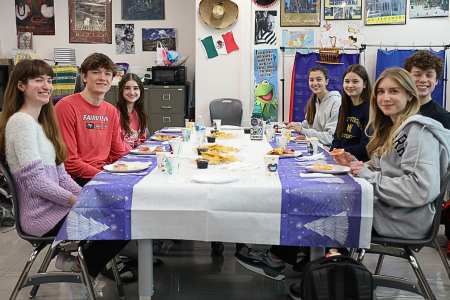 Today, our world is closer than ever before. Effective communication and understanding the complexities of other cultures are integral to success in various industries.
Today, our world is closer than ever before. Effective communication and understanding the complexities of other cultures are integral to success in various industries.
In Fairview Park, world language students learn more than just the words of a new language. They also delve deeply into the countries and cultures of these languages, providing new perspectives and experiences during a student’s educational journey.
One way world language students experience this is through food.
“Our standards are about culture as well as language,” Spanish teacher Sandy Arancibia explained. “We need to understand culture. We talk about the different countries and some of the foods because they are very different. We’re trying to help them understand that what we eat at Nuevo Acapulco is not necessarily what they eat in all Spanish-speaking countries.”
In Arancibia’s classes, students are encouraged to prepare foods to help them understand unique cultures, ingredients, and flavors.
“They can bring in anything they want from a Spanish-speaking country, and we talk about all the ingredients,” Arancibia added. “If they don’t want to prepare something or they can’t, then they can do background reports either on the foods or mealtimes in different countries or if they prefer to do traditions of December and January celebrations.
“Usually, kids have a lot of fun doing it,” Arancibia added. “Just the experience of preparing something and finding their favorite dish is fun.”
Students in Meghann Peters’ French classes experience French food and culture through projects and field trips. For example, in November, some French III students visited Young Chefs Academy in Strongsville to learn how to prepare a French dish. This year, students chose macarons, a French “sandwich cookie” traditionally filled with cream or jam.
“Last year, our French IV and V students made Yuletide log cakes, like Bûche de No?l, which was really fun,” Peters said. “One year, we made Mardi Gras foods. The first year we went, we made quiche, green beans, and chocolate mousse - Mousse Au Chocolat. It’s always fun. I try to take them once a year.”
Another fun, food-centric project in French involves middle school students. At Mayer Middle School, highly motivated students can take French or Spanish beginning in the seventh grade.
“I’m doing a food truck project with my eighth graders,” Peters explained. “Their food truck has to be themed based on the food from different French-speaking countries throughout the world. So, if you’re doing Martinique, for example, you’re going to have all the different fruits and vegetables and lots of seafood. In Senegal, there’s also seafood and a lot of peanuts involved. And, they have to pay attention to the different regions as well.”
“I like to specify the different individual countries, and more so when students are in the earlier levels,” Arancibia added. “In world language curriculum, there’s something where we look at everything in cultures from products to practices and what perspective we can learn about culture by looking at them. And we start that on day one, whether they are seventh graders or tenth graders starting their language.”
Ultimately, the days featuring unique flavors and cultures in world languages are fun for students and teachers alike.
“Every time there’s food, the kids anticipate it, and they love it,” Peters said. “It’s wonderful, and it’s bonding for classes. It can make for a chaotic day, but it’s good chaos. It’s fun. That’s one of the reasons I chose French instead of a different area. I like the language. I like the culture. I wanted to do things like this.”
“It is fun, and that’s why we wish the students would embrace the fact that world languages are different than anything else they can do at school,” Arancibia added. “We always tell them that the farther they go, they’re learning a skill. It’s something you can truly apply to any other field you decide to go into.”